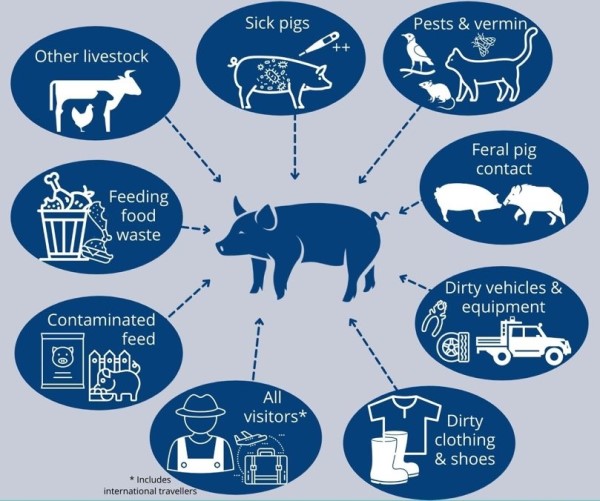Pig biosecurity
10 Dec 2021
Pigs pose some unique biosecurity issues in Australia and are ‘high risk’ animals for exotic diseases. The Australian Pork Industry is worth $5.2 billion annually and NSW is the largest producer and exporter of pork and pork products in Australia. That is why it is vital that everyone does their bit to protect the pork industry.
One of the major difficulties with the pork industry in NSW is capturing and monitoring pig ownership, and educating pig owners. Smallholders may innocently purchase or acquire a pig/s and fail to meet their legal and biosecurity obligations, therefore putting the entire industry at risk.
General biosecurity duty - Pigs
The Biosecurity Act 2015 requires that anyone who deals with biosecurity matter or carrier (such as pigs, pig products and pig feed/bedding/manure etc), and who knows or reasonably should know of the associated biosecurity risks must take measures to prevent, eliminate or minimise those risks as far as is reasonably practicable.
Under the Biosecurity Act 2015 you are expected to know about biosecurity risks associated with your industry, business, day-to-day work and hobbies. And a requirement under the Biosecurity Regulation 2017 is for pig owners to notify (report) certain notifiable pests and diseases. These notifiable diseases include Emergency Animal Diseases (EAD) such as African Swine Fever (ASF) or Foot and Mouth Disease (FMD). Pigs are also reservoirs for Swine Influenza, a zoonotic disease which can spread to humans.
What’s at risk?
Both Foot and Mouth Disease and African Swine Fever are exotic to Australia (not currently found here), and it is vital that we keep them out due to the potentially devasting consequences of an insurgence to the national pork industry, as well as pet pigs. The most significant risk for entry of both diseases is via the feeding of illegally imported contaminated pig products. Virus fragments of both diseases have been detected in pork products seized at the border. With outbreaks of African Swine fever spreading throughout South-East Asia and Papua New Guinea within the last 2 years, it is a timely reminder that animal diseases can spread quickly and do not respect international borders.
All pig owners are encouraged to implement (and understand!) a pig biosecurity management plan on their property. A biosecurity plan is a document that describes your on-farm processes and how pest or disease risk will be addressed. Resources are available for all levels of pig keeping and production on the Farm Biosecurity website

Image: Disease pathways
Foot and mouth disease is an infectious viral disease affecting all cloven hooved animals. It is characterised by a high fever, and blisters on the mouth and hooves.
African swine fever is a highly contagious viral disease unique to both domesticated and wild pigs, with no treatment and no vaccine available. It is characterised by a high fever, blotchy skin and high rates of death in pig herds. It spreads rapidly through contact with infected animals or contact with contaminated pens, trucks clothing or feed.
What is swill feeding?
Swill feeding is illegal in Australia. Swill means feed that contains meat, bone, blood, offal or hide from a mammal or has been in contact with such products. This includes food waste from households, restaurants, bakery waste (containing meat such as pies or sausage rolls), as well as any food which may have contacted these products. This means that a person must not feed pigs OR allow access to OR fail to prevent pigs accessing, any material that contains or that has been in contact with a mammal product. A person also must not allow or direct another person to feed material containing a mammal product to a pig or allow a pig to have access to the material.
“Swill feeding audits” are compliance inspections on pig enterprises, carried out by either DPI or LLS officers at least every four years. These audits are aimed at education, and allow an excellent opportunity to refresh knowledge surrounding the risks of swill feeding, as well as accessing current industry trends and information.
Notify/Report if you suspect Animal Emergency Disease – 1800 675 888.
References
Agency | website |
Department of Primary Industries | Information brochures about protecting pigs from exotic animal diseases (nsw.gov.au) |
Local Land Services | |
Australian Pork Limited | |
Farm Biosecurity |